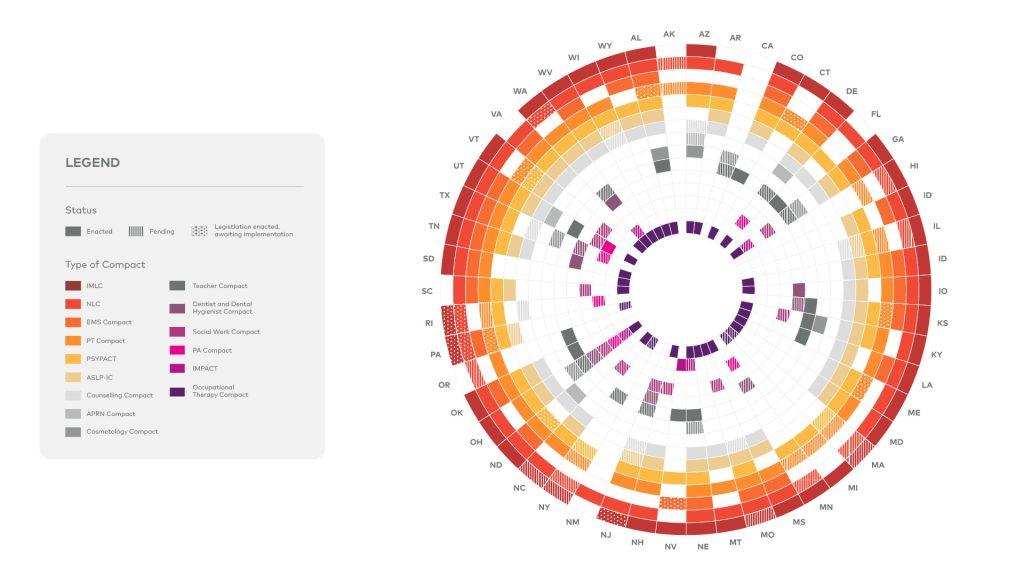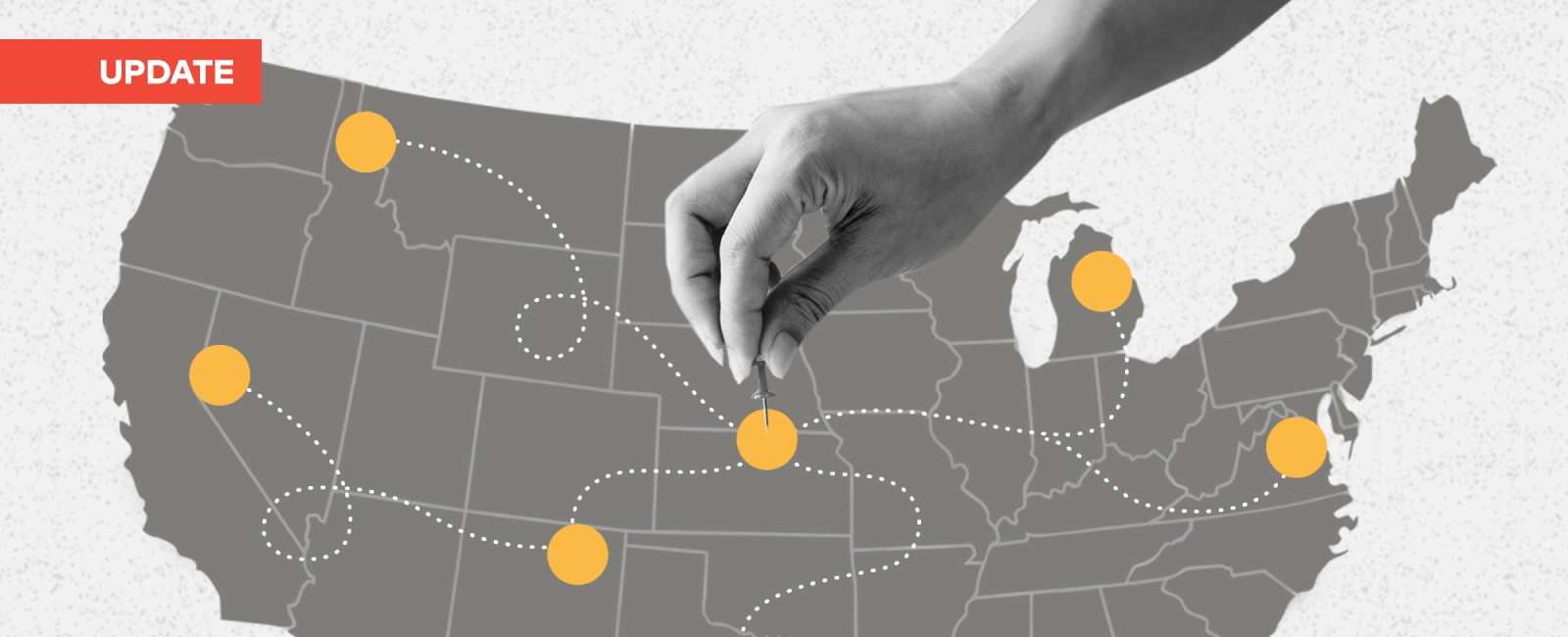Update 7/6/23 – Multistate licensing agreements in the U.S. have only gained traction throughout this year’s legislative session. Since the publication of this article, 12 interstate compacts have expanded to include new jurisdictions. Leading the pack was the Counseling Compact, which added five new states. The updates to our index are as follows:
- Interstate Medical Licensure Compact (IMLC): Hawaii.
- Nurse Licensure Compact (NLC): Rhode Island, Washington.
- Emergency Medical Services Compact (EMS Compact): Nevada, Oklahoma, South Dakota.
- Physical Therapy Compact (PT Compact): Connecticut, Maine, Vermont.
- Psychology Compact (PSYPACT): Florida, South Carolina, Vermont.
- Audio-Speech Language Pathology Interstate Compact (ASLP-IC): Maine, Montana, Vermont.
- Counseling Compact: Indiana, Iowa, North Dakota, Oklahoma, Vermont.
- Cosmetology Compact: Alabama.
- Teacher Compact: Alabama, Florida, Louisiana, Nebraska, Oklahoma.
- Dentist and Dental Hygienist Compact: Iowa, Tennessee, Washington.
- Interstate Massage Compact (IMpact): Nevada.
- Occupational Therapy Compact (OT Compact): Louisiana, Montana.
Our lists of compact states have been updated to reflect this information. They have also been updated to address inconsistencies with currently available data.

In the United States, regulators and professional associations have spent centuries discussing and formulating interstate compacts – license reciprocity agreements intended to help solve issues with professional mobility between different jurisdictions.
Because most states have their own unique licensing ecosystems, professionals are frequently limited in their ability to travel across state lines, which can create barriers for access to services in underserved areas. Compacts aim to address this issue and promote unified standards of care across the board.
In this article, we’ll take an exhaustive look at existing interstate licensing compacts in the U.S. as well as some compacts currently in development and pending activation.
Interstate Medical Licensure Compact (IMLC)
The Interstate Medical Licensure Compact (IMLC) was first conceived by state medical boards in 2013, who at the time were beginning to take notice of how telemedicine would encourage more physicians to practice in multiple states. Over the course of a few years, state board officials laid the groundwork for the creation of an interstate agreement that would allow physicians more professional mobility
when practicing across state lines.
In the fall of 2014, the Federation of State Medical Boards assisted with the introduction of model legislation for what would become the IMLC. Over the next couple years, state legislators worked to implement the compact, which finally became operational in April 2017. Today, the compact includes 38 states as well as the District of Columbia and the Territory of Guam, with legislation pending in Massachusetts, Missouri, New York, and North Carolina.
To participate in the compact and conduct work freely between member states, physicians must designate their State of Principal License (SPL), or the home state in which they hold a full medical license. Physicians must primarily reside in their SPL, conduct at least 25% of their practice in the SPL, be employed to practice within the SPL, and use the SPL as their state of residence for tax purposes.
After providing a formal Letter of Qualification from their SPL, physicians can apply to be credentialed through the IMLC, which also requires graduation from an accredited medical school as well as completion of certain licensure exams like the USMLE or the COMLEX-USA. Under the criteria for compact licensure as it stands, about 80% of U.S. physicians currently qualify. Though the compact operates under a Commission that administers the compact, licensure is still issued by compact states themselves.
IMLC states:
- Alabama
- Arizona
- Colorado
- Connecticut**
- Delaware
- Georgia
- Hawaii
- Guam
- Idaho
- Illinois
- Indiana
- Iowa
- Kansas
- Kentucky
- Louisiana
- Maine
- Maryland
- Michigan
- Minnesota
- Mississippi
- Montana
- Nebraska
- Nevada
- New Hampshire
- New Jersey*
- North Dakota
- Ohio
- Oklahoma
- Pennsylvania*
- Rhode Island*
- South Dakota
- Tennessee
- Texas
- Utah
- Vermont**
- Washington
- West Virginia
- Wisconsin
- Wyoming
*States in which the IMLC has been passed but not yet implemented.
**States which are involved in the compact and can receive professionals from other jurisdictions but do not qualify as SPLs.
Nurse Licensure Compact (NLC)
The origins of the Nurse Licensure Compact (NLC) date back over 25 years. In 1995, the National Council of State Boards of Nursing (NCSBN), recognizing inefficiencies in the traditional state-by-state nurse licensure system, caught notice of a report by the Pew Commission entitled “Reforming Health Care Workforce Regulation: Policy Considerations for the 21st Century.” This report argued single-state licensure would ultimately fail to meet the health care needs and expectations of the future.
Over the next few years, NCSBN worked to lay the foundation for what would become the NLC, starting with a mutual recognition licensure model in 1997. Two years later, the Council introduced the official compact, which focused on registered nurses (RNs) and licensed practical/vocational nurses (LPNs/VNs) and created uniform rules and policies for participating states. By 2000, Texas, Wisconsin, and Utah had become the first states to join the compact.
Over the next 15 years, the compact grew to include as many as 25 states, but growth reached a sudden halt as states grew concerned the agreement could not ensure adequate competence and education across the board. Potential new compact states were now worried the public could be endangered by a lower standard of practice in the nursing discipline if they joined. In response to this concern, NCSBN developed the Enhanced Nursing Licensure Compact (eNLC), which added uniform license requirements as well as background checks and new disciplinary provisions.
To date, 41 jurisdictions have passed legislation enacting the eNLC. Of these, Pennsylvania, Rhode Island, the Virgin Islands, and Washington are still awaiting proper implementation, and a host of other states (Alaska, Hawaii, Illinois, Massachusetts, Minnesota, New York, and Oregon) have introduced compact legislation but have not yet passed it.
NLC states:
- Alabama
- Arizona
- Arkansas
- Colorado
- Delaware
- Florida
- Georgia
- Guam
- Idaho
- Indiana
- Iowa
- Kansas
- Kentucky
- Louisiana
- Maine
- Maryland
- Mississippi
- Missouri
- Montana
- Nebraska
- New Hampshire
- New Jersey
- New Mexico
- North Carolina
- North Dakota
- Ohio
- Oklahoma
- Pennsylvania (awaiting implementation)
- Rhode Island (awaiting implementation)
- South Carolina
- South Dakota
- Tennessee
- Texas
- Utah
- Vermont
- Virginia
- Virgin Islands (awaiting implementation)
- Washington (awaiting implementation)
- West Virginia
- Wisconsin
- Wyoming
Emergency Medical Service Officials Licensure Compact (EMS Compact)
The Emergency Medical Service Officials Licensure Compact (EMS Compact) originated in 2012 as regulators attempted to address the day-to-day issue of EMS personnel being deployed across state boundaries. For example, EMS personnel can be obliged to cross state lines to work if they are part of a multi-state agency or if they are staffing large unplanned events, among many other circumstances.
In 2013, a National Advisory Panel convened to establish guiding principles for the drafting of the compact. This panel comprised representatives from 23 stakeholder organizations, including the American Ambulance Association, the Federation of State Medical Boards, the National Association of EMS Educators, the National Registry of EMTs, the Federal Bureau of Investigation, and the USDA Forest Service.
Compact legislation was drafted, revised, and promoted over the following years. Activation of the compact required at least 10 states to implement the model legislation, and in 2020, at a meeting of the Interstate Commission for EMS Personnel Practice, this was finally achieved. Today, the EMS Compact comprises 24 member states and around 325,000 compact providers.
EMS Compact states:
- Alabama
- Colorado
- Delaware
- Georgia
- Idaho
- Indiana
- Iowa
- Kansas
- Louisiana
- Mississippi
- Missouri
- Nebraska
- Nevada (awaiting implementation)
- North Dakota
- Oklahoma
- Pennsylvania
- South Carolina
- South Dakota
- Tennessee
- Texas
- Utah
- Virginia
- West Virginia
- Wyoming
Physical Therapists Licensure Compact (PT Compact)
The Physical Therapy Compact (PT Compact), enacted in April 2017, creates an ecosystem among constituent states where physical therapists can obtain privileges to practice across state lines while only holding a PT license in their home states of residence. To practice across state lines, PTs must meet jurisprudence requirements for the states in which they wish to practice (which can sometimes involve passing a jurisprudence exam) and pay the corresponding compact privilege fees.
PT Compact states with full implementation:
- Arizona
- Arkansas
- Colorado
- Delaware
- Georgia
- Indiana
- Iowa
- Kentucky
- Louisiana
- Maryland
- Mississippi
- Missouri
- Montana
- Nebraska
- New Hampshire
- New Jersey
- North Carolina
- North Dakota
- Ohio
- Oklahoma
- Oregon
- South Carolina
- South Dakota
- Tennessee
- Texas
- Utah
- Virginia
- Washington
- West Virginia
- Wisconsin
States where PT Compact legislation has been passed but not yet implemented:
- Alabama
- Connecticut
- Kansas
- Maine
- Pennsylvania
- South Carolina
- South Dakota
- Vermont
- Wisconsin
States with PT Compact legislation pending:
- Alaska
- Hawaii
- Illinois
- Massachusetts
- Michigan
- Minnesota
- New York
- Rhode Island
Psychology Interjurisdictional Compact (PSYPACT)
In 2011, the Association of State and Provincial Psychology Boards (ASPPB) established a task force to explore the use of technology in the field of psychology and how it would impact the profession in the coming years. By August 2013, the ASPPB Board of Directors had approved guidelines for the practice of telepsychology, which laid the groundwork for discussions regarding an interjurisdictional compact.
These discussions officially began in January 2014 with the ASPPB’s Telepsychology Advisory Workgroup, and by August 2014, the board had released an initial draft of the Psychology Interjurisdictional Compact (PSYPACT), model legislation allowing psychologists in constituent states to practice across state lines (particularly via telehealth) without applying for additional certification.
In August 2019, Georgia became the seventh state to enact PSYPACT (Arizona having been the first), triggering the formation of the PSYPACT Commission. To date, 38 states have enacted the compact, with legislation pending in Massachusetts and New York.
PSYPACT states:
- Alabama
- Arizona
- Arkansas
- Commonwealth of the Northern Mariana Islands
- Colorado
- Connecticut
- Delaware
- District of Columbia
- Florida
- Georgia
- Idaho
- Illinois
- Indiana
- Kansas
- Kentucky
- Maine
- Maryland
- Michigan
- Minnesota
- Missouri
- Nebraska
- Nevada
- New Hampshire
- New Jersey
- North Carolina
- North Dakota (awaiting implementation)
- Ohio
- Oklahoma
- Pennsylvania
- Rhode Island
- South Carolina
- Tennessee
- Texas
- Utah
- Vermont (awaiting implementation)
- Virginia
- Washington
- West Virginia
- Wisconsin
- Wyoming
Audiology & Speech-Language Pathology Interstate Compact (ASLP-IC)
First introduced in state legislatures in January 2020, the Audiology and Speech-Language Pathology Interstate Compact (ASLP-IC) offers audiologists (and speech-language pathologists) the privilege to practice in a remote compact state without the need for an additional license. Its intention is to improve continuity of care for audiology patients, improve access to audiology, and facilitate telehealth services. To date, 29 states have enacted the ASLP-IC into law, with legislation pending in Illinois, New Jersey, Pennsylvania, and Wisconsin.
ASLP-IC states:
- Alabama
- Arkansas
- Colorado
- Delaware
- Georgia
- Idaho
- Indiana
- Iowa
- Kansas
- Kentucky
- Louisiana
- Maine
- Maryland
- Mississippi
- Missouri
- Montana
- Nebraska
- New Hampshire
- North Carolina
- Ohio
- Oklahoma
- South Carolina
- Tennessee
- Utah
- Vermont
- Virginia
- Washington
- West Virginia
- Wyoming
Counseling Interstate Licensure Compact
In January 2019, the American Counseling Association (ACA) began coordinating efforts to establish a multistate compact allowing for freer movement of counselors between member states. The Counseling Interstate Licensure Compact was developed over the next two years and finalized in December 2020. The compact was activated after legislation was enacted by 10 states and it now comprises 28 states.
Counseling Compact states:
- Alabama
- Arkansas
- Colorado
- Delaware
- Florida
- Georgia
- Indiana
- Iowa
- Kansas
- Kentucky
- Louisiana
- Maine
- Maryland
- Mississippi
- Montana
- Nebraska
- New Hampshire
- North Carolina
- North Dakota
- Ohio
- Oklahoma
- Tennessee
- Utah
- Vermont
- Virginia
- Washington
- West Virginia
- Wyoming
States with Counseling Compact legislation pending:
- Arizona
- Illinois
- Missouri
- New Jersey
- Rhode Island
- Texas
- Wisconsin
Compacts in development and/or pending activation
Advanced Practice Nurse Compact (APRN Compact)
Adopted by the NCSBN Delegate Assembly in August 2020, the Advanced Practice Nurse Compact (APRN Compact) intends to increase access to APRN care over state lines. If enacted, the APRN Compact would allow for APRNs with 2,080 hours of practice or more to practice across jurisdictional lines in other compact states while holding just one multistate license in their home states.
Like many other compacts, the APRN Compact establishes uniform licensure requirements and facilitates license mobility and information sharing to ensure patients in compact states enjoy increased access to quality APRN care. The compact will come into effect once seven states have enacted the model legislation. To date, only Utah, Delaware, and North Dakota have enacted the compact, but several other states have legislation pending.
States with APRN Compact legislation pending:
- Arizona
- Hawaii
- Kentucky
- Maryland
- Montana
- New York
- Texas
Cosmetology Compact
Currently pending activation, the Cosmetology Compact was developed by the Council of State Governments (CSG) in partnership with the Future of the Beauty Industry Coalition. Once enacted, it will allow for license reciprocity between states and allow cosmetologists greater professional mobility to practice across jurisdictional lines. Though legislation has only been passed in Alabama, Arizona, and Kentucky, it is pending in several other states.
States with Cosmetology Compact legislation pending:
- California
- Georgia
- Nebraska
- Ohio
- Texas
Interstate Teacher Mobility Compact (Teacher Compact)
The Interstate Teacher Mobility Compact, developed by the CSG and the Department of Defense (DoD) as well as the National Association of State Directors of Teacher Education (NASDTEC), aims to increase mobility for licensed teachers, cutting down on barriers to license portability and increasing access to education in underserved areas.
Teacher Compact states:
- Alabama
- Colorado
- Florida
- Kansas
- Kentucky
- Louisiana
- Nebraska
- Nevada
- Oklahoma
- Oregon
- Utah
States with Teacher Compact legislation pending:
- California
- Delaware
- Georgia
- New Jersey
- New York
- Ohio
- Washington
Dentist and Dental Hygienist Compact
The Dentist and Dental Hygienist Compact, formulated by the American Dental Association (ADA) and the American Dental Hygienists’ Association, would create license reciprocity for dentists and dental hygienists between participating states. Model legislation has been enacted in Iowa, Tennessee, and Washington, and it is currently pending in several other states.
States with Dentist and Dental Hygienist Compact legislation pending:
- Kansas
- Minnesota
- New Jersey
- Ohio
- Texas
Dietitians Compact
The Interstate Compact for Dietitians is currently being put together by the Academy of Nutrition and Dietetics (AND) in partnership with the CSG and the DoD to foster license portability for dietitians in the United States. Legislation has not yet been put forth in any state.
School Psychologists Compact
The CSG and the DoD, in partnership with the National Association of School Psychologists (NASP) is creating the Interstate Compact for School Psychologists which would facilitate multistate practice among school psychologists. Legislation has not yet been put forth in any state.
Social Work Compact
The Social Work Compact, developed by the Association of Social Work Boards (ASWB) in partnership with the CSG and the DoD, aims to create multijurisdictional licensing pathways for social workers who seek to practice across state lines. Though legislation has not yet been enacted anywhere, it is pending in several states.
States with Social Work Compact legislation pending:
- Georgia
- Kentucky
- Missouri
- New Hampshire
- New Jersey
- North Carolina
- Ohio
- South Carolina
- Utah
- Vermont
Physician Assistant Licensure Compact (PA Compact)
The Physician Assistant Licensure Compact (PA Compact) intends to give PAs the privilege to practice in other compact states, provided they adhere to all applicable laws and regulations wherever they are practicing. PA Compact legislation has only been enacted in Utah, but it has been filed in Delaware, Minnesota, Texas, Ohio, and Rhode Island.
Massage Therapy Compact (IMPACT)
The Interstate Massage Compact (IMPACT) was developed by the Federation of State Massage Therapy Boards (FSMTB) in partnership with the CSG and the DoD. It intends to create an additional licensing pathway for certified massage therapists to practice across jurisdictional lines in participating compact states. Legislation has been enacted in Nevada and it is pending in Georgia, Nebraska, Ohio, and Washington.
Occupational Therapy Compact
Under the Occupational Therapy Compact (OT Compact), Occupational Therapists (OTs) and Occupational Therapist Assistants (OTAs) would be granted professional mobility between participant states by way of compact privileges. Though many states have enacted OT Compact legislation, the agreement is not expected to be activated until mid-2024.
States with OT Compact legislation passed:
- Alabama
- Arizona
- Arkansas
- Colorado
- Delaware
- Georgia
- Indiana
- Iowa
- Kentucky
- Louisiana
- Maine
- Maryland
- Mississippi
- Missouri
- Montana
- Nebraska
- New Hampshire
- North Carolina
- Ohio
- South Carolina
- South Dakota
- Tennessee
- Utah
- Virginia
- Washington
- West Virginia
- Wisconsin
- Wyoming
The future of interstate licensing
As the need for professional mobility throughout the U.S. grows and evolves in response to changes in technology and service delivery systems, so too will regulatory approaches to interstate licensure. Whether multijurisdictional compacts are an appropriate substitute for unified, nationwide licensing systems remains to be seen, but as the development of agreements like the Teacher Compact and the Cosmetology Compact shows, the creation of compacts by regulators and professional associations will play a key role in the discussion of occupational licensing at large for years to come.
MORE VOICES ARTICLES

Trust on trial: Navigating the murky waters of scientific integrity
As fraudulent research papers flood academic journals, the sanctity of scientific discovery is under siege, challenging the very foundation of trust we place in peer-reviewed publications. With AI now both a tool for creating and detecting such deceptions, the urgency for a robust, independent regulatory framework in scientific publishing has never been greater.

Do regulators deserve deference?
In a pivotal moment for regulatory law, the U.S. Supreme Court’s review of the Chevron doctrine could redefine the bounds of deference courts give to regulatory agencies, potentially inviting more challenges to their authority. This critical examination strikes at the heart of longstanding legal principles, signaling a significant shift in the landscape of regulatory oversight and its interpretation by the judiciary.

From Frankenstein to Siri: Accountability in the era of automation
As AI advances in sectors from health care to engineering, who will be held accountable if it causes harm? And as human decision-makers are replaced by algorithms in more situations, what will happen to uniquely human variables like empathy and compassion? Harry Cayton explores these questions in his latest article.

Regulating joy: The risky business of festivities
In his final Voices article of 2023, Harry Cayton reflects on our enthusiasm for participating in cultural festivities that often cause injuries or even deaths, which has led some governments to attempt to regulate these risky celebrations.

Building my regulator of tomorrow with LEGO® bricks
What should the regulator of tomorrow look like? While there may be no definitive vision, contributor Rick Borges gets creative with answering this important question, drawing inspiration from a favorite toy to ‘build’ a model of an effective future regulator.

‘Thin’ and ‘thick’ rules of regulation: Cayton reviews Daston’s history of what we live by
Lorraine Daston explores fascinating examples of rulemaking throughout history in her new book, ‘Rules: A Short History of What We Live By.’ In this article, Harry Cayton discusses what regulators can learn from Daston’s work.








